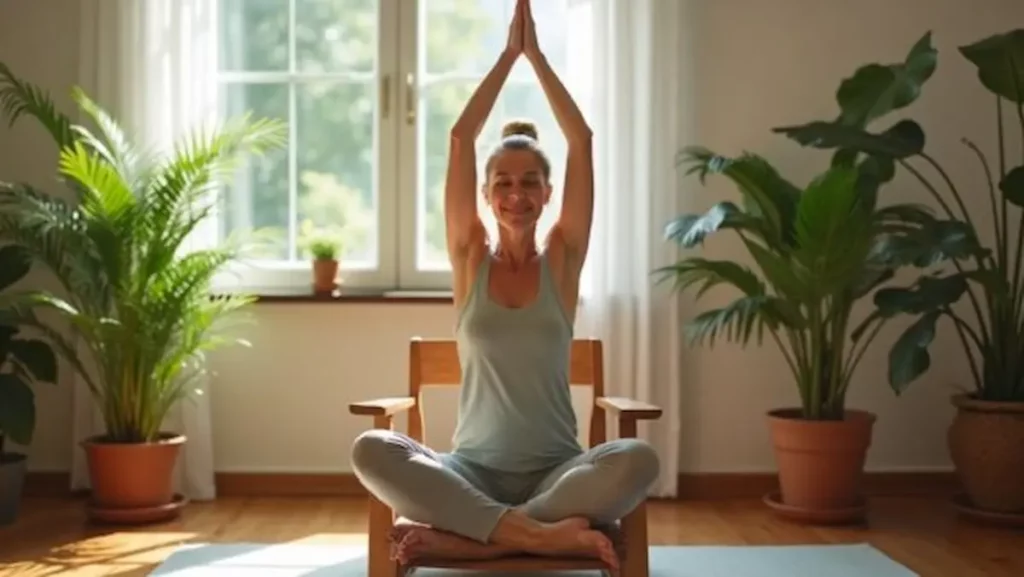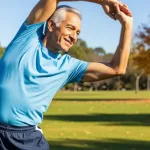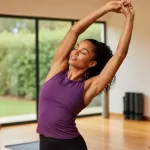
What exercises should seniors avoid? 5 Examples
Growing older means knowing which exercises to skip; discover five risky moves seniors should avoid to stay safe and healthy.
Chair yoga brings the benefits of traditional yoga to a seated position, making it ideal for those with limited mobility, balance challenges, or anyone seeking a gentler, accessible practice. Through slow, controlled movements, mindful breathing, and simple relaxation techniques, chair yoga eases tension, improves flexibility, and builds strength gradually.

Beyond physical benefits, chair yoga also promotes mental clarity, emotional well-being, and mindfulness. For beginners, this adaptable style allows individuals to experience the empowering effects of gentle movement on both body and mind, creating a foundation for long-term wellness.
Chair yoga is a practical adaptation of traditional yoga, incorporating seated postures or using a chair for support. This accessible approach allows people of all ages and mobility levels to experience the benefits of yoga safely and effectively.
Key elements of chair yoga include:
By combining these elements, chair yoga offers a holistic exercise experience that integrates both physical and mental benefits, making it a practical choice for beginners and those with physical limitations.
Chair yoga is suitable for a wide range of individuals, including:
The adaptability of chair yoga ensures participants can safely strengthen muscles, improve flexibility, and enhance overall well-being without overexertion or risk of injury.
Chair yoga includes foundational poses adapted for seated practice or using a chair for support. These poses focus on mobility, stability, and mindful breathing. Some of the most effective movements include:
Focusing on proper alignment and slow, controlled movements ensures stability, maximizes benefits, and reduces the risk of injury.
Chair yoga stretches muscles and joints, promoting gradual improvement in range of motion. Even gentle seated movements help loosen tight muscles and support better posture.
Chair yoga exercises engage the core, arms, and legs, building muscle strength safely. These low-impact routines develop endurance and stability without straining joints.
Seated and modified standing poses in chair yoga enhance balance and coordination, which is especially beneficial for older adults or individuals recovering from injuries.
The combination of gentle movement and mindful breathing calms the nervous system, reduces stress, and promotes relaxation. Consistent practice fosters mental clarity and emotional balance.
Chair yoga encourages attention to breath and movement, cultivating mindfulness. This helps participants feel present and reduces distractions from daily stressors.
One of the most significant advantages of chair yoga is its accessibility. Individuals of varying abilities and fitness levels can practice safely in a controlled, supportive environment.
Chair yoga is easy to incorporate into everyday life:
Even 10–15 minutes per session can help maintain mobility, reduce stress, and promote a sense of calm and well-being.
Although chair yoga is gentle, safety precautions are essential:
By following these precautions, chair yoga remains a safe and effective practice for people of all ages and abilities.
Despite its benefits, chair yoga faces several misconceptions:
Educating participants about these misconceptions encourages broader adoption and a positive experience.
Here’s a safe, beginner-friendly routine:
This routine can be expanded or repeated daily for cumulative benefits in flexibility, strength, and mindfulness.
Many resources are available to support beginners:
Selecting reliable sources ensures proper technique, alignment, and safety, especially for those with limited mobility or health considerations.
Chair yoga provides a gentle, accessible approach to traditional yoga, making it ideal for individuals with limited mobility, seniors, or anyone seeking a low-impact, safe practice. By focusing on seated postures, controlled movement, and mindful breathing, chair yoga promotes flexibility, strength, balance, and emotional well-being.
Integrating chair yoga into daily routines supports long-term physical and mental health, reducing stress, enhancing mobility, and fostering mindfulness. With consistent practice and attention to proper alignment, chair yoga empowers individuals to experience the benefits of yoga safely, making it an essential tool for holistic wellness and a balanced lifestyle.
Whether practiced at home, in a workplace, or a community center, chair yoga demonstrates that gentle movement can have profound effects on body, mind, and overall quality of life.

Growing older means knowing which exercises to skip; discover five risky moves seniors should avoid to stay safe and healthy.

Gaining mobility through targeted exercises can transform seniors' lives by enhancing independence and reducing injury risk, but how exactly does it work?

Jumpstart your strength training by syncing workouts with your menstrual cycle—discover the surprising benefits that await when you train with your body’s rhythm.

Get the best techniques to stretch your knee effectively and safely, improving flexibility and preventing injury—discover the key moves you shouldn’t miss.

Learn how stretching before exercise boosts performance and prevents injuries, unlocking benefits you might be missing out on. Discover the key reasons now.

The ultimate guide reveals essential techniques and tips to prevent injuries—discover how simple changes can protect your body and enhance your performance today.